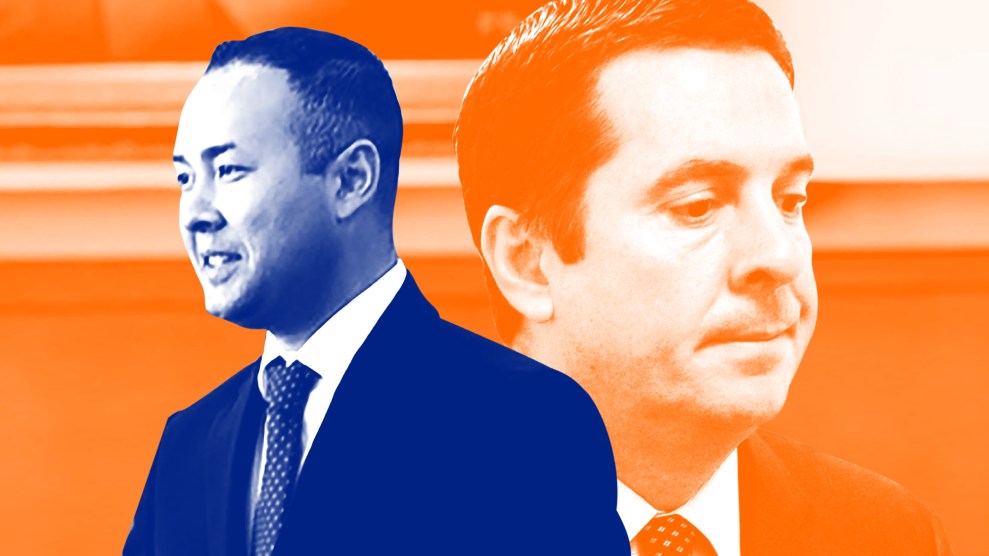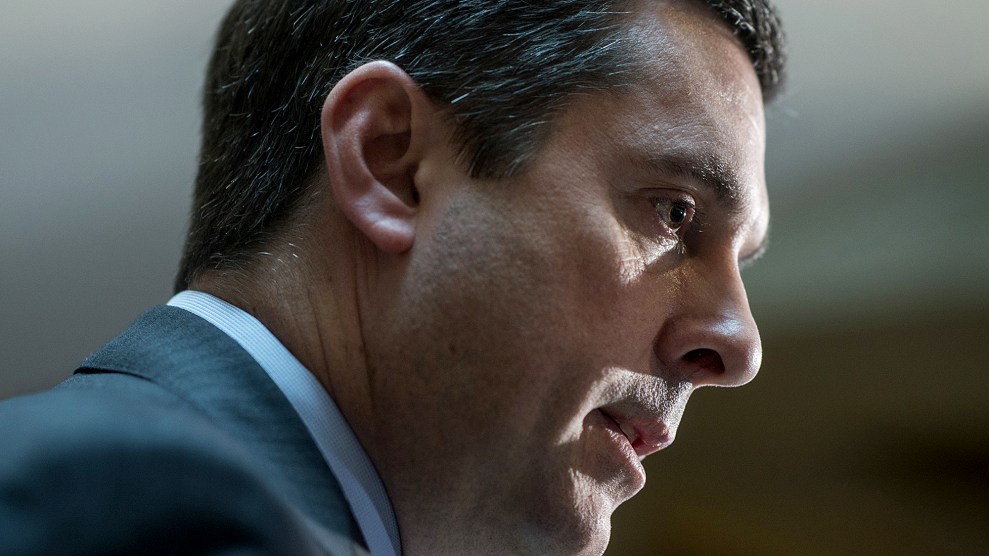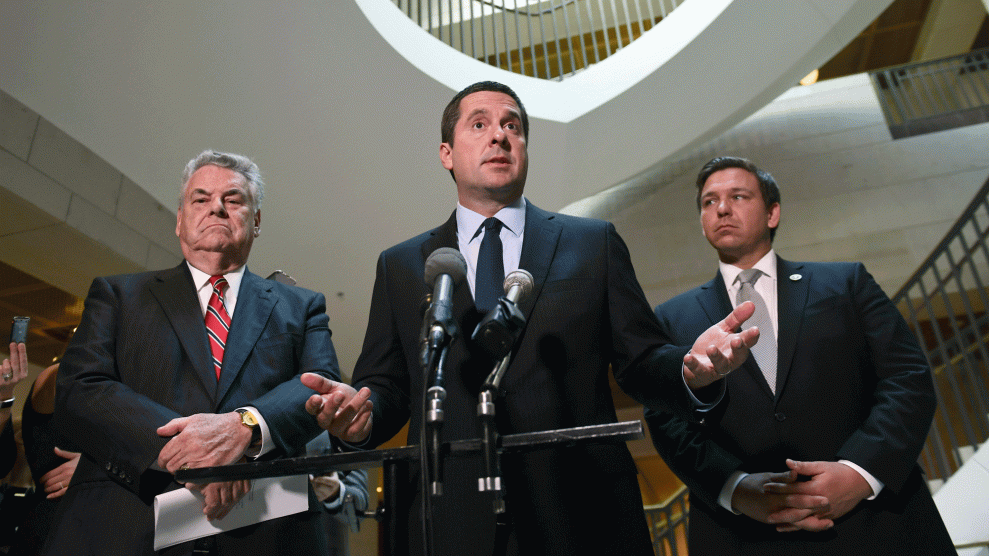
Andrew Janz (left) and Rep. Devin Nunes (R-Calif.)Mother Jones illustration
At high noon on a sunny Tuesday, a crowd of protestors lined the block where Rep. Devin Nunes (R-Calif.) has an office in Clovis, California. There are about 250 people at this Tuesday Vigil, a weekly event that’s grown over the past year from its humble beginnings as two people with a sign that read, “No ban. No wall,” protesting President Donald Trump’s travel ban, which Nunes supported.
Even as Nunes, the chairman of the House intelligence committee, has become a lightning rod for his now-infamous memo, which sought to undermine the Special Counsel Robert Mueller’s probe of the Trump campaign, he represents an extremely safe Republican district. He’s won seven of his eight elections with more than two-thirds of the vote. Yet there are some registered Republicans among the throng chanting “Kick him out!” on the sidewalk outside his office. “This memo trick? It’s ridiculous,” Micki Whitaker says. “I’ve written to Nunes several times,” says Janet Kroeger, “with no response.”
For months, the message at the Tuesday Vigil has been anti-Trump and anti-Nunes, but now the protesters have someone to root for: Andrew Janz, a 34-year-old Fresno prosecutor who has staked his claim as Nunes’s main Democratic opponent in a race that, for once, promises to be interesting. He’s at today’s rally, dressed in a gray suit with an obligatory American flag pin, doing the politician thing: shaking hands, giving hugs, and getting pulled aside by TV news crews. A car rolls by and a woman yells, “I’m voting for you, Andrew!” “Thank you!” he shouts back. “Tell everybody, okay? We gotta do this.”
Until a little more than a year ago, Janz says, he had no real political ambitions. He grew up in the district, the son of immigrant parents from Canada and Thailand who worked low-wage factory jobs and insisted that he go to college. Eventually, he went to law school and became a prosecutor. His last assignment at the Fresno district attorney’s office was in the violent crimes unit, going after “people who try to kill people,” as he puts it. His goal had always been to rise through the ranks as a D.A. and maybe then join the U.S. Attorney’s office. “That was always my trajectory,” he says.
Then Trump won the election, and Nunes started landing in the news for making a secret trip to the White House and pushing the baseless theory that the Obama administration authorized the illegal “unmasking” of Trump campaign officials. “To me, it appeared early on that [Nunes] was obstructing justice,” says Janz. Previously, he had mostly thought of Nunes as a politician who never met with his constituents. (He hasn’t held a town hall meeting since 2010.) “I started asking, “Who is going to take on Nunes? And I found out: nobody.”
Last April, Janz decided to run. The House Ethics Committee had just opened an investigation to determine whether Nunes had disclosed classified information when he publicly stated that intelligence agencies had incidentally collected information about the president’s associates. “And I thought, ‘What better person to challenge someone who’s under an ethics investigation than a prosecutor that’s sworn to uphold the highest of ethical standards?’” Janz says. (The ethics investigation was closed in December.)
Janz has already gotten attention for trolling Nunes on his own turf: In November, he put up a billboard in Fresno that depicted Nunes and Trump as monkey-backpack-wearing children under the control of Russian President Vladimir Putin. Last week, he released a campaign ad that strung together media clips slamming Nunes’s recent behavior.

Even as Janz turns up the heat on Nunes, he has a long way to go. In a district with an 11-point voter registration advantage for Republicans, Nunes has easily slayed one Democratic opponent after another since 2002. In 2016, he was reelected with 68 percent of the vote, and Trump took the district by a nearly 10-point margin.
In previous elections, the Democratic candidates facing Nunes have mostly been “of the sacrificial lamb variety,” Thomas Holyoke, a professor of political science at Fresno State University, told Mother Jones. But Janz seems more serious. “All three major candidates are good candidates,” says Joseph Altschule, the former chair of the Tulare County Democratic Central Committee, referring to the other Democrats lining up to challenge Nunes. (They include Ricardo “Rico” Franco, a businessman, and Bobby Bliatout, the son of Hmong refugees who manages community healthcare clinics.) But with Janz’s background as a prosecutor, he says, “There’s a good chance law enforcement will back him. The crossover potential is there for him perhaps more than others. He understands where he is, and he understands the makeup of his district.”
Democrats in the district will also have to overcome their historic timidity. Altschule describes Democrats in the region as “leaners.” “I’m a fairly visible Democrat in this community,” he says, “and every once in a while, I will get someone who will kind of lean in, and whisper, ‘You know, I’m a Democrat, too.’ Shhh. Don’t tell anybody.”
Janz will also have to win over voters who once supported Nunes. Bob Whalen, the Republican mayor of Clovis and a friend of both candidates, says, “There’s a reason Democrats haven’t fielded any reasonable candidates that were going to make much progress against Devin—and it’s because Devin is well-liked.” Despite the national attention Nunes has received due to his association with Trump, Whalen says, “We’re not defining Devin’s work on our behalf in the district based on the last 18 months.”
Plenty of Nunes’s constituents care little about the Russia collusion story and his role in it. “It’s fake—the whole Russia deal,” a fifth-generation farmer in the district recently told the Los Angeles Times. Agriculture is the region’s main economic driver, and many residents care most about increasingly scarce water and jobs. “Devin has focused on trying to improve business and the economy here,” Whalen says. However, he acknowledges that unemployment in the district “is lagging behind the state and national unemployment rates,” to the point of being “depressing.” (District 22 has a 7.9 percent unemployment rate, compared to 4.2 percent for California as a whole.)
Whalen thinks Janz will have put more emphasis on local issues to make any headway with voters. “So far it’s been a campaign about, ‘Hey, look at Devin. He’s closely associated with Trump. Here’s Devin and he’s dropped this memo.’ And it’s like, ‘Okay, we’re kinda tired of hearing about all of that. Let us know what you think about water, about how it’s tough for people to do business here. If he starts talking about those things, then, yeah, he can get some traction,” says Whalen. “But right now his campaign is all about nationalizing the election and bringing in the money.”
Lately, Janz is seeing a lot of money come in. His campaign has raised more than $800,000, according to campaign manager Heather Greven. (None of Nunes’ previous opponents raised more than $399,000.) Its best day so far—the day after the Nunes memo was released—brought in $164,000. It’s still nowhere near the kind of cash that Nunes has at his disposal—$3.8 million—but it’s enough to launch an ambitious campaign. And advertising dollars go a lot further in the Central Valley media market.
Janz says that the money will allow his campaign to launch “a massive voter education effort” to drill into local issues. “We have some of the most underserved communities, some of the least funded schools. We have one gun-related crime a night in Fresno. We have some of the dirtiest water in the country. We have lead contamination that is worse than some of what is being seen in Flint, Michigan, and it’s completely being ignored by the media and by our members of Congress—in particular Devin Nunes.” Janz is also building his ground game. He and his supporters have been hosting events and knocking on doors.
Local organizers say momentum is building. “Is there going to be enough force to make this change?” asks Valerie Ehrlich, the co-leader of South Valley Civics, a political outreach group, at a meeting with local Democrats. “Well, some of those ‘leaners’ Joe [Altschule] was talking about, they’re now holding a poster on Main Street downtown, and they’ve never done that before. And they’re coming to meetings and organizing candidate forums, and they’ve never done that before. They’re coming out to a political meeting of an indie grassroots group, and that’s never existed before. I think that there is the start of something that’s shifting.”
Image credit: Andrew Janz for Congress; J. Scott Applewhite/AP
















